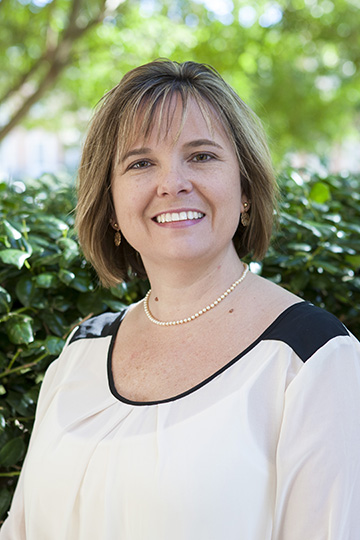
by Olivia Odom
Jill Pence, executive director of Samford University’s Experiential Learning and Simulation Center within the College of Health Sciences, recently earned a specialty certification for simulation and health care by passing the exam administered by the Society for Simulation in Healthcare.
This achievement has positive implications not only for Pence’s professional development, but also for the advancement of the Experiential Learning and Simulation Center as it provides a distinction that few universities can match.
“This is a wonderful achievement, and it acknowledges Jill’s professionalism, competence and mastery of knowledge in simulation,” said Vice Provost Nena Sanders. “By earning this certification, Jill’s leadership will make it so our center is set apart from others. It builds to our credibility of providing excellence in experiential learning and simulation.”
Pence’s certification also moves forward the college’s plan to pursue accreditation for the Experiential Learning and Simulation Center. “It is required of us to have a faculty member become certified before we seek provisional accreditation. With this first step complete, we plan to start the process this fall,” Sanders said.
The certification exam represents the standardized expectations for simulations across the world. “By becoming certified, I have access to multiple resources through the society to better prepare our faculty members to implement simulation into their courses,” said Pence.
Pence was selected to serve as executive director of the Experiential Learning and Simulation Center in 2016 and led the space renovation for the center.
Pence has been a part of Ida Moffett School of Nursing faculty since 2008, and she played an integral role in developing and implementing the undergraduate nursing simulation program within the school. She has been one of the leaders of the school’s disaster simulation drill since its inception five years ago. The annual drill now includes the entire College of Health Sciences and other units from across the campus, as well as community emergency response partners.
“Preparation for the exam expanded my knowledge,” Pence said. “I have been in health care simulation for about 12 years now, but preparing for the exam helped bring in the theoretical foundation of simulation. This is important to include in faculty development as more health science programs begin using simulation.”
This knowledge will be shared with other College of Health Sciences faculty as Pence works to coordinate simulations and experiential learning opportunities across the college’s four schools.
The Experiential Learning and Simulation Center, which spans 22,000 square feet in the college’s new facilities on east campus, serves to unify the Ida Moffett School of Nursing, School of Health Professions, McWhorter School of Pharmacy and School of Public Health in the mission of preparing practitioners through interprofessional education in a context of Christian mission who are called into the field of health care.
Olivia Odom is a journalism and mass communication major and a news and feature writer for the College of Health Sciences.
